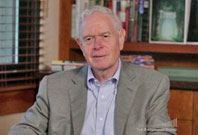 Under Paul Brest's 12-year guidance as its president, the William and Flora Hewlett Foundation—one of the largest philanthropic organizations in the world—grew to 100 employees and a $7 billion endowment. Known for his focus on outcomes measurement, the philanthropy thought leader was not afraid to spend money during his tenure on capacity building, organizational effectiveness, general operating support, and new ideas, areas many other philanthropists are reluctant to fund. Brest also was not afraid to take risks or to be candid if such a risk failed.
Under Paul Brest's 12-year guidance as its president, the William and Flora Hewlett Foundation—one of the largest philanthropic organizations in the world—grew to 100 employees and a $7 billion endowment. Known for his focus on outcomes measurement, the philanthropy thought leader was not afraid to spend money during his tenure on capacity building, organizational effectiveness, general operating support, and new ideas, areas many other philanthropists are reluctant to fund. Brest also was not afraid to take risks or to be candid if such a risk failed.
Bridgespan interviewed Brest just before he retired from Hewlett last year—he's now co-director of Stanford University’s Center on Philanthropy and Civil Society—during which he shared the following three lessons on strategic philanthropy.
Provide nonprofit overhead support.
With a view that is still somewhat rare in philanthropy, Brest believes that providing general operating support to nonprofits is key. Such grants can be made to provide for the organization as a whole or for only specific work, depending on where the grantmaker's and grantee's interests intersect, but within that context should enable as much autonomy as possible. Brest says that since funders aren't on the front lines doing the actual work, an unrestricted grant is in everybody's best interest since it allows an organization the autonomy to maximize resources. Of course, such a grant cannot be given to just any organization—the nonprofit must meet strict standards, in particular, outstanding leadership and the will and capacity to think about outcomes and strategies in the same way as the grantmaker.
Watch Paul Brest discuss supporting nonprofit overhead.See a complete archive of Paul Brest' videos.
Take risks, but be clear about goals.
Brest believes philanthropy has a special role in society: Politicians need to get reelected, which means that they tend to be highly risk-averse. Established businesses want to mitigate risks for their shareholders. In contrast, philanthropists have the unparalleled opportunity to take risks that have the potential to effect great social and environmental changes. This is especially true when tackling problems such as climate change, where the obstacles are daunting and the likelihood of success low. "No institution has the ability to [take such risks] compared to philanthropy because we don't depend on funds from other people," he says. Still, Brest is also a vocal proponent of having clear-cut goals, without which you can't possibly measure your progress or understand what's working or not working. "You can't know whether you're succeeding or failing unless you're pretty clear about what outcomes you're achieving," he says.
Watch Paul Brest discuss philanthropy's unique role.
Promote learning by being open to failure.
Brest believes that helping others avoid making the same mistakes and sharing what works are important components of philanthropy. Yet to get to that point, your own organization must be open enough that you can learn those lessons. Such openness does not come easily. Early into his work at Hewlett, Brest noticed that although people were happy to talk about their successes, they were far less likely to discuss failures—even amongst themselves. To encourage open communication that could promote crucial learning from such failures within the foundation, he instituted a "worst grant contest." Initially people were dubious and wanted to balance it with a "best grant contest," but over time the worst grant contest became a resounding success. "The motivation is really the intrinsic motivation of being able to learn something and help the rest of the foundation learn something," he says.
Watch Paul Brest discuss how to encourage grantees to be forthcoming when things are not going well.
To the new philanthropist, Brest says that the first step in your unique philanthropic journey is to find the goals that you're passionate about. "Once you've done that, don't lose the heart," he says, "but then become relentlessly analytic and outcome oriented to make sure that you actually make the difference that your passion says you should make."
Paul Brest is also the co-author of Money Well Spent: A Strategic Plan for Smart Philanthropy. For some additional resources, see the below:
- A Decade of Outcome-Oriented Philanthropy (Stanford Social Innovation Review; Spring 2012)
- Learning from Paul Brest's Leadership at Hewlett(Stanford Social Innovation Review; September 2011)
- "Foundations": A Q&A with Paul Brest, President (William and Flora Hewlett Foundation; August 26, 2011)


